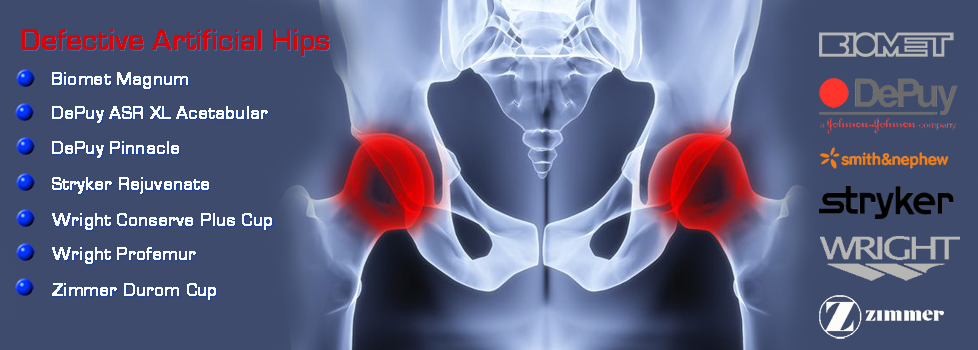Defective Wright Conserve Artificial Hips
 The hip replacement lawyers at Doyle Law are pursuing product liability lawsuits for individuals who are experiencing or have experienced problems after receiving a Wright Conserve artificial hip. The problems you've experienced may be caused by design defects with the artificial implant. The Wright Conserve is a metal-on-metal design which has been shown to cause significant problems in similar designs by other manufacturers. Doyle Law now represents clients nationwide who are dealing with defective artificial hip implants.
The hip replacement lawyers at Doyle Law are pursuing product liability lawsuits for individuals who are experiencing or have experienced problems after receiving a Wright Conserve artificial hip. The problems you've experienced may be caused by design defects with the artificial implant. The Wright Conserve is a metal-on-metal design which has been shown to cause significant problems in similar designs by other manufacturers. Doyle Law now represents clients nationwide who are dealing with defective artificial hip implants.
Compensation may be available to you through a Wright Conserve hip lawsuit due to the manufacturer’s failure to adequately test the impact of the metal-on-metal hip replacement system or warn you about the risk that the implant may loosen or fail within a few years of surgery. Obviously, a second "revision" surgery is generally not needed or anticipated within years of your original surgery and any complications should raise a red flag for you.

The Problem With Wright Conserve Artificial Hips
The Wright Conserve Plus hip replacement is a metal-on-metal artificial hip system which can relase metal particles into the hip joint and surrounding tissue. The cobalt-chromium metal femoral head rotates within the cobalt-chromium metal acetabular cup, often resulting in particles to be released. The result of this process could be metallosis, tissue necrosis, pseudotumors and other problems as the particles move through a patient.
The Wright Conserve Plus Total Resurfacing Hip System was approved by the FDA on November 18, 2009, and, since that time, it has been implanted in thousands of patients throughout the United States. In its premarket approval (PMA) order statement, it states, "[t]he conserve plus total resurfacing hip system is intended for patients who, due to their relatively younger age or increased activity level" may not be suitable for traditional hip surgeries. Even though it was marketed as a better alternative to other hip replacement devices, the Wright Conserve Artificial Hip System has been failing in patients very soon after surgery. Reports suggest that this model of artificial hip implant may be prone to failure within just a couple years rather than the expected 15-20 years that other devices are expected to last.
The design of a typical hip implant consists of components made of metal and plastic. The Wright Conserve has three components, all made of metal - a metal femoral head, metal taper insert and metal acetabular cup. This poses a problem for many users, because as the metal parts rub against one another, microscopic shavings of metal are released into the hip joint and surrounding tissue. This often causes inflammation, loosening and other problems, including metal poisoning (Cobalt & Chromium).
Potential signs of Wright Conserve Plus hip problems:
- Unexplained Hip Pain
- Swelling and Tissue Damage
- Unexplained Tumors
- Difficulty Standing or Walking
- Loosening of the Hip Implant
- Additional Hip Revision Surgery
- Elevated levels of Cobalt and Chromium in blood & urine samples
An ever-increasing number of individuals (throughout the U.S.) have reported experiencing problems with the Wright Conserve hip replacement. The common complaints often involve loosening, dislocation, wear or failure of the implant. We believe that these failures are due to the design of the device and our experts agree. A typical artificial hip implant is expected to last more than 15 years; however, many individuals with Wright Conserve Plus implants have required revision surgery within just a few years to replace or correct problems.
Wright Conserve lawsuits are now being filed. The claims now being filed by plaintiffs include the problems with the design of the Wright Conserve that were known to the device manufacturer, yet they continued to market the implant as safe and effective. Rather than issuing a Wright Conserve hip replacement recall, the artificial hip system was aggressively marketed as an implant superior to other hip systems. This is clearly not the case.
Wright Conserve Artificial Hip Lawyers
As the design of metal-on-metal hip implants has been evaluated by our experts in the artificial hip litigation, research has shown that metal-on-metal hip replacements, including the Wright Conserve, are no more effective than traditional artificial hip implants. However, metal-on-metal implants increase the risk of revision surgery due to large amounts of metallic debris generated by the implant over time. The effect of the debris - swelling in the tissue, loosening of the joint - hasten the need for a revision surgery.
Rather than halting the use of Conserve artificial hip implants once evidence came to light regarding the defective design, it appears that Wright Medical placed profits over the safety of consumers. As a result, individual injury claims have accrued and Wright Conserve lawsuits have grown. Doyle Law is now reviewing potential claims on behalf of individuals throughout the United States.

Contact A Wright Conserve Artificial Hip Replacement Attorney
If you, a friend, or family member experienced Wright Conserve hip replacement complications or problems following surgery, request a free consultation and claim evaluation to determine whether our law firm may be able to assist with a lawsuit. We charge no fees unless we obtain a recovery. A Wright Conserve hip lawsuit may be a viable option for you. Call our Birmingham, Alabama offices today for a free consultation. The number to reach either office is (205) 533-9500.
All cases are reviewed by our Wright Conserve hip attorneys under a contingency fee agreement, which means that there are never any out-of-pocket expenses to investigate your case and there are no attorney fees unless a recovery is obtained. To review a lawsuit for yourself, a friend or family member, request a free consultation and claim evaluation.
The Doyle Law Firm's experienced injury lawyers have extensive experience with product liability claims, specifically those involving defective medical devices. Even if you're not sure of your artificial hip implant model, we can help you. We'll order your medical records to identify your device and determine whether a Wright hip replacement lawsuit makes sense for you.
Alabama, Georgia, and many other states have a two year statute of limitations on filing certain product liability and personal injury claims. It takes time to acquire medical records and draft pleadings, so please do not delay in contacting us if you have any concern that your hip replacement device may be causing your pain and suffering. Do not wait another day and risk losing your claim.




 Fosamax, Boniva, Actonel, Aredia, and Zometa - medication prescribed to treat osteoporosis - are linked to femur fractures after 3 years of use. If you took any of this medication (or any combination thereof) and suffered a femur fracture,
Fosamax, Boniva, Actonel, Aredia, and Zometa - medication prescribed to treat osteoporosis - are linked to femur fractures after 3 years of use. If you took any of this medication (or any combination thereof) and suffered a femur fracture,  Mesh used during surgery to repair the vaginal wall has caused women to experience mesh erosion into the vagina, prolapse, pain during intercourse, incontinence, bowel or bladder perforation, bleeding and serious infection. We're now accepting clients with claims against AMS, Bard, Boston Scientific, Ethicon, and Johnson & Johnson. If you took have suffered any of these side effects,
Mesh used during surgery to repair the vaginal wall has caused women to experience mesh erosion into the vagina, prolapse, pain during intercourse, incontinence, bowel or bladder perforation, bleeding and serious infection. We're now accepting clients with claims against AMS, Bard, Boston Scientific, Ethicon, and Johnson & Johnson. If you took have suffered any of these side effects,  A growing number of metal-on-metal artificial hip implants are being recalled due to early failures and some patients suffering from metallosis - metal debris released from the hip compontents inflame the surrounding tissue and enter the bloodstream, causing elevated levels of cobalt and chromium. We're now accepting clients with claims aginst Biomet, DePuy, Stryker, Smith & Nephew, Wright, and Zimmer. If you have (or had) one of these devices, we can help to protect your legal rights. To contact us,
A growing number of metal-on-metal artificial hip implants are being recalled due to early failures and some patients suffering from metallosis - metal debris released from the hip compontents inflame the surrounding tissue and enter the bloodstream, causing elevated levels of cobalt and chromium. We're now accepting clients with claims aginst Biomet, DePuy, Stryker, Smith & Nephew, Wright, and Zimmer. If you have (or had) one of these devices, we can help to protect your legal rights. To contact us, 
